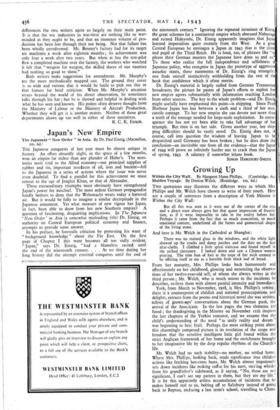Japan's New Empire
THE Japanese conquests of last year must be almost unique in history. An effort absurdly slight, in the space of a few months, won an empire far richer than any plunder of Hitler's. The terri- tories most vital to the Allied economy—our principal supplies of rubber and tin, important resources of oil, iron and bauxite—fell to the Japanese in a series of actions where the issue was never even doubtful. To find a parallel for this achievement we must retreat to the age of Jenghiz Khan, or that of Alexander.
These extraordinary triumphs must obviously have strengthened Japan's power for mischief. The most ardent German propagandist hardly bothers to deny that the Wehrmacht wears today a battered air. But it would be folly to imagine a similar decrepitude in the Japanese armament. Yet what measure of new vigour has Japan, in fact, been able to draw from her new Southern empire? A question of fascinating, disquieting implications. In The Japanese ' New Order' in Asia (a somewhat misleading title) Dr. Einzig, an authority on Central European political economy and finance, attempts to provide some answer.
In his preface, he forestalls criticism by protesting his want of " background knowledge " about the Far East. On the first page of Chapter I this want becomes all too sadly evident. " Japan," says Dr. Einzig, " had a blameless record until the end of the nineteenth century. . . . At no time during her long history did she attempt external conquests until the end of the nineteenth century." Ignoring the repeated invasions of Korea, the great schemes for a continental empire which obsessed Nabunaga and ruined Hideyoshi, Dr. Einzig apparently imagines that Japan learned imperialism quite recently from the West. As a good Central European he envisages a Japan in 1943 that is the client and pupil of the Third Reich. He is fond, too, of phrases like "to please their German masters the Japanese have done so and so." To those who realise the full independence and selfishness Japanese policy, who recognise in Japan the prototype of aggressive autarkic states, these statements of Dr. Einzig's ring strangely ; one finds oneself instinctively withholding from the rest of the book that confidence which it often merits.
Dr. Einzig's material is largely culled from German Transocean broadcasts; the picture he paints of Japan's efforts to exploit her new empire agrees substantially with information reaching London from other sources. The key to the whole problem—and Dr. Einzig might usefully have emphasised this point—is shipping. Since Pearl Harbour Japan has lost between a sixth and a third of her mer- cantile tonnage. To her new empire she can devote not more than a tenth of the tonnage needed for large-scale exploitation. In conse- quence she has not yet been able to take full advantage of her triumph. But time is on her side. Given another year, her ship- ping difficulties should be vastly eased. Dr. Einzig does not, of course, call into question the wisdom of leaving Japan to be despatched until Germany has been broken ; but he &hes draw the conclusion—an inevitable one from all the evidence—that the Japan of 1944 will prove an infinitely harder nut to crack than the Japan of spring, 1943. A salutary if somewhat jejune book.
SIMON HARCOURT-SMITH.


























 Previous page
Previous page